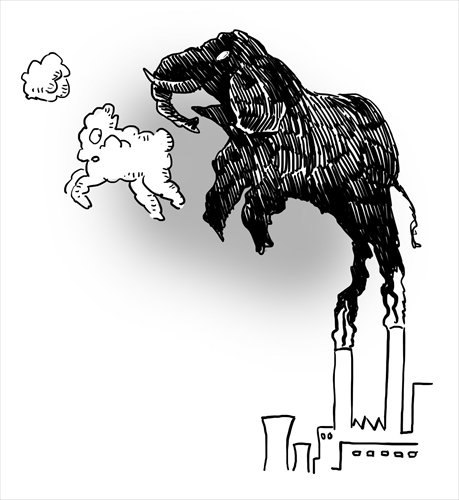Asian giants share scourge of pollution

Illustration: Liu Rui/GT
Beijing's smog has been in the news in recent years. A new study by the Shanghai Academy of Social Sciences has revealed that the city is the second least clean in the world's major 40 cities. The pollution readings have been continuously above "unhealthy," and the State Council has been compelled to declare that reducing pollution is one of China's biggest goals in 2014.
However, Beijing is not the only city facing the menace of smog. Pollution levels in India's capital, New Delhi, have also caught the international media's attention of late. A study conducted by Yale University has ranked India 174th out of 178 countries in Environmental Performance Index 2014.
The level of PM 2.5, tiny particulates that damage health, has increased from 168 micrograms per cubic meter in January 2011 to 183 micrograms per cubic meter in January 2014 in Delhi.
Smog wracked havoc in the city in winter. It is being held responsible for increasing cases of lung ailments and other respiratory and cardiac disorders among Delhiites. Besides, smog also caused several disruptions in traffic. Many flights were canceled or diverted. Train services across North India were also hit with many trains running way behind schedule.
With the number of private vehicles in the city rising at a rapid rate, vehicular emissions have turned into one of the primary sources of air pollution. The city has more vehicles on its roads than anywhere else in India.
New Delhi's air quality had improved substantially after the Supreme Court's order in 1998 that public transport vehicles should use compressed natural gas (CNG) instead of petrol or diesel was implemented. However, it began to worsen since 2007 due to the addition of more than 1,000 private vehicles per day to its roads.
Apart from vehicular emissions, the poor air quality is also attributed to industrial emissions, construction work and burning of agricultural waste.
Beijing has announced several measures to tackle this problem. For instance, it has put in place a health alert system that is supposed to take effect after the smog persists. China also says it will enforce stringent environmental standards for factories and is taking steps to restrict car purchases.
Delhi has yet to introduce any mechanisms to keep its citizens informed or warned about the air quality, although there was a move by the previous Delhi state government led by Sheila Dikshit to expand the monitoring system as well as issue smog alerts and health advisories. Neither has it implemented any policies to limit car purchases, by say, taxing car owners or levying parking charges, although these measures were recommended by the previous government.
With the political stalemate in Delhi continuing in the aftermath of the resignation of the city's former chief minister Arvind Kejriwal, these policies have been stalled indefinitely.
The establishment of policies needs to send appropriate signals to the citizens first by not regarding it as "normal" phenomenon. The widespread chalta hai (roughly translated as "it's okay") attitude that pervades authorities and common people alike in the country should be discarded.
The concerned authorities should install a better and wider monitoring apparatus and issue warnings when the air quality is particularly risky so that people who are most vulnerable to high pollution levels, including lung and cardiac patients, children and the old, do not venture out.
Across the world, 3.2 million people are being killed by pollution-related diseases every year, with the majority of them in Asia. In India alone, more than 600,000 premature deaths are being caused by air pollution.
Both India and China face similar, and sometimes transboundary, environmental problems that are causing not only health or economic anxieties but also security concerns. Air pollution is one among them. This is a time when both countries need to set aside their political differences and cooperate in jointly fighting this scourge.
The author is a geopolitical and environmental security analyst based in Kerala, India. dhanasreej@gmail.com